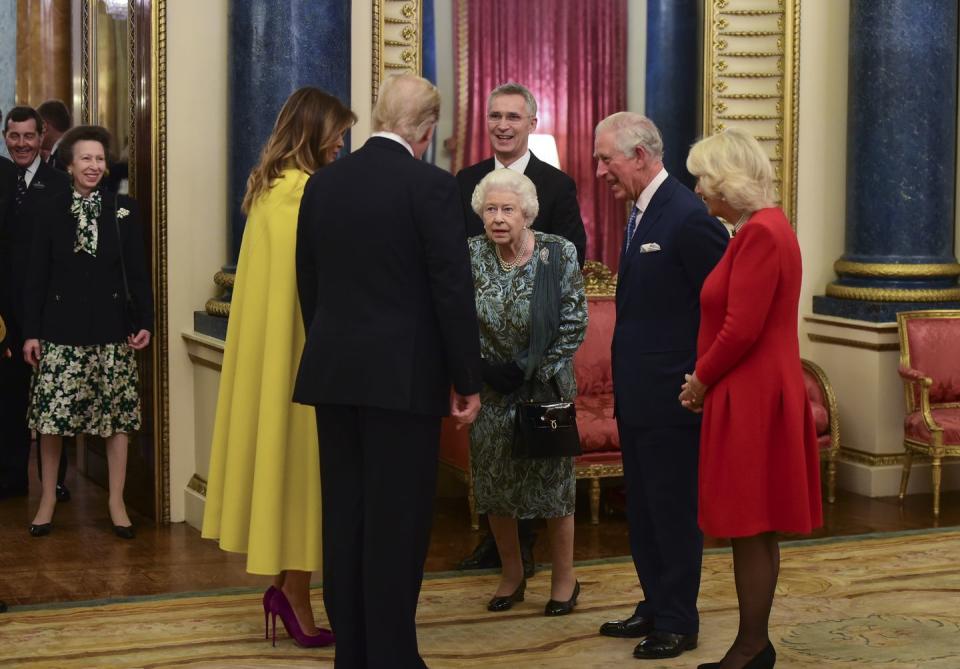The Royal Family Issues a Rare Response to Rumors That the Queen Plans to Retire at 95

Queen Elizabeth has undoubtedly lived a life of immense privilege and tremendous influence (if not quite power) but one thing her position does not afford her is the opportunity to retire. At least not officially.
And this week, the Queen, who is 93, again confirmed her intention to reign until the end of her life. A spokesman for Clarence House, the press office for Prince Charles, told People magazine on Thursday that “There are no plans for any change in arrangements at the age of 95—or any other age.”
This time around, the rumors of early retirement are the result of a serious crisis that the Queen and her family face: The fallout surrounding Prince Andrew, the Duke of York's disastrous BBC interview about his friendship with convicted sex offender Jeffrey Epstein. Following an avalanche of public criticism, the Queen's second son stepped back from public duties "for the foreseeable future" on November 20.
As People's royal correspondent Simon Perry points out, in the days following Andrew's announcement, it emerged that while it was the Queen who officially sanctioned her son's announcement, she had consulted with both of her subsequent heirs, her son Charles and grandson William, about the best way to handle the outrage.

This, in turn, brought up renewed discussion of a claim made last year by Robert Jobson, in a biography of Prince Charles, that the Queen was seriously considering pulling back from public duties when she turned 95.
In Charles at Seventy: Our Future King, Jobson wrote that senior Palace aides had told him that at 95, the Queen will “trigger a period of regency,” in which she will grant her eldest son the “full power to reign.”
That same aide told Jobson that "the Queen has given the matter of her passing hears considerable thought." Hence the statement, courtesy of her son, that she has "no plans for any change in arrangements."
If the Queen were to step down, it has speculated that it would not be an abdication (i.e. her giving up the thrown and allowing Charles to be crowned) but rather a regency, in which Prince of Wales carries out the monarch's duties in her name. The last regency in England, which famously kicked off the Regency Period, during which their was a flowering of British architecture, literature, and culture, came at the end of the reign of George III. His son, the future King George IV, ruled as his father's proxy from 1811 to 1820.
George III was deemed unfit to rule at the time, a key detail relevant to any speculation about a regency for Queen Elizabeth. As Sally Bedell Smith, respected biographer of the Queen and Charles, pointed out to People, the Regency acts dictate a specific legal process by which the Queen might step back, one that involves many people together to make the decision. “The Queen can’t just wave a queen wand and say Charles you are my regent," says Bedell Smith. "It’s not her call—and it’s not his call.”

So for now, the Queen—and her heir—will continue to navigate this unique period of her reign. She is, after all, the oldest and longest-serving monarch in British history; no one has been in this position before. Despite the traditions and rules that dictate her role, Elizabeth and the rest of the family are in uncharted territory. She is in her 90s, her husband, Prince Philip, has retired from royal duties, and she no longer makes foreign trips. Prince Charles will undoubtedly continue to do more by his mother's side—and in her stead. But only she can fulfill the duties of the constitutional monarchy: Appointing a Prime Minister, meeting with that person, and assenting to legislation.
For now Prince Charles will remain a prince, and not a regent or a monarch.
You Might Also Like

